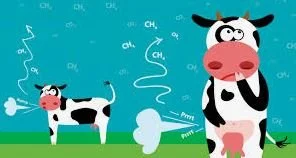Cow Burps
I love it when my government agency scientist customers ask me, “What do you think about…?” on agricultural and environmental issues. No one will ever say that I’ve never been opinionated, but the gray hairs on my head my lead one to expect me to have experience. Rifling through old photos I came across one of me working on a cattle ranch when I was barely legal drinking age and thought who is that kid? You know what all those years add up to? Perspective, my friends, perspective.
The topic of discussion last week with my news junkies was the product Bovaer which hit the consumer news cycles back in June but is now only working its way into social media sites and the feeds of influencers.
Approved by the Food and Drug Administration (FDA) in May for the use in lactating dairy cows. It’s also being used in Europe and Japan’s dairy industry and for beef cattle in Australia and other beef producing countries throughout the world.
What is it? A fancy anti-gas medication for ruminants because we’ve been told that cows are polluting the planet with their burps and farts. Yes, I wholeheartedly understand how a cow’s (and other cud chewing critters’) stomachs work. They’re like big beer vats. We’ve all had our share of frothy drafts. Those bubbles are gas. The gas that is made by the fermentation of cellulose and sugars in the rumen is methane, CH4 to those of us who passed Organic Chemistry.
Cows can pass as much as 500 liters of methane each day. In comparison, humans flatulate a liter because we are omnivores who do not digest cellulose. Even those of us who are sun choke aficionados will pass nowhere near as much gas as our four-stomached fellow vertebrates.
And it’s not just cows the 1.5 billion cows humans raise for dairy, meat, and draft, but all ruminants—over 3.6 billion on the planet who are belching out methane.
So what are we going to do to save the planet from this super-charged greenhouse gas rapidly warming our planet? We’re going to give our cows a pill. Pills are the answer to everything and the latest solution to the problem is another drug.
Nope, we’re not even going to consider all the other major greenhouse gas emitters, are we? We’re just going to keep on driving, flying, heating and cooling our homes while blaming the melting glaciers on the farmers’ cows.
And trash, so much trash. Don’t even say you recycle, because you don’t, whether you know it or not. I separate my recyclables from garbage, but I’ve watched for years as it all goes into a single stream and gets dumped at the local landfill. We do a better job at composting than we do trash. Maryland even approved the composting of humans this year. That will save us 535 pounds of C02 (another greenhouse gas) per human cremation.
There is so much more low hanging fruit where we could reduce our anthropogenic impact on the planet instead of a blanket vilification of our food system.
This coming week the Mid-Atlantic Grazing Conference will be held at the Washington County Agricultural Education Center in Boonsboro, Maryland. These are the folks who like to say, It’s the HOW, not the COW when it comes to raising ruminants in an environmentally responsible manner. This is where you’ll find the farmers who are raising food and producing dairy products that end up at farmers’ markets. They’re the same producers who are just as concerned about the biodiversity in their soils and on their farms as they are the numbers on their spreadsheets.
By shopping at the farmers market you have already taking a vested interest in reducing greenhouse gasses. Some of these include reduced food miles traveled from production to consumer and less to zero packaging. Most of our vendors have long switched to compostable packaging. Drugging cows is not going to solve the greenhouse gas problems on this planet. Making wise and informed decisions about how we live in this world will.

